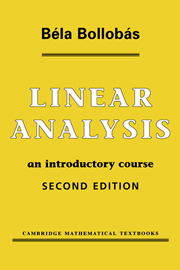Book contents
- Frontmatter
- Contents
- Preface
- 1 Basic inequalities
- 2 Normed spaces and bounded linear operators
- 3 Linear functionals and the Hahn–Banach theorem
- 4 Finite-dimensional normed spaces
- 5 The Baire category theorem and the closed-graph theorem
- 6 Continuous functions on compact spaces and the Stone–Weierstrass theorem
- 7 The contraction-mapping theorem
- 8 Weak topologies and duality
- 9 Euclidean spaces and Hilbert spaces
- 10 Orthonormal systems
- 11 Adjoint operators
- 12 The algebra of bounded linear operators
- 13 Compact operators on Banach spaces
- 14 Compact normal operators
- 15 Fixed-point theorems
- 16 Invariant subspaces
- Index of notation
- Index of terms
16 - Invariant subspaces
Published online by Cambridge University Press: 05 June 2012
- Frontmatter
- Contents
- Preface
- 1 Basic inequalities
- 2 Normed spaces and bounded linear operators
- 3 Linear functionals and the Hahn–Banach theorem
- 4 Finite-dimensional normed spaces
- 5 The Baire category theorem and the closed-graph theorem
- 6 Continuous functions on compact spaces and the Stone–Weierstrass theorem
- 7 The contraction-mapping theorem
- 8 Weak topologies and duality
- 9 Euclidean spaces and Hilbert spaces
- 10 Orthonormal systems
- 11 Adjoint operators
- 12 The algebra of bounded linear operators
- 13 Compact operators on Banach spaces
- 14 Compact normal operators
- 15 Fixed-point theorems
- 16 Invariant subspaces
- Index of notation
- Index of terms
Summary
Given a complex Banach space X, which operators T ∈ B(X) have nontrivial closed invariant subspaces? This question, the so-called invariant subspace problem, is the topic of this brief last chapter. Until fairly recently, it was not known whether there was any operator T without a non-trivial (closed) invariant subspace, and it is still not known whether there is such an operator on a (complex) Hilbert space.
Much of the effort concerning the invariant-subspace problem has gone into proving positive results, i.e. results claiming the existence of invariant subspaces for operators satisfying certain conditions. Our main aim in this chapter is to present the most beautiful of these positive results, Lomonosov's theorem, whose proof is surprisingly simple.
As we remarked earlier, the Riesz theory of compact operators on Banach spaces culminated in a very pleasing theorem, Theorem 13.8, which nevertheless, did not even guarantee the existence of a single nontrivial invariant subspace. This deficiency was put right, with plenty to spare, in Chapter 14, but only for a compact normal operator on a Hilbert space. Now we return to the general case to prove Lomonosov's theorem, which claims considerably more than that every compact operator has a non-trivial invariant subspace. Before we present this result, we need some definitions and a basic result about compact convex sets.
As in Chapters 13 and 14, all spaces considered in this chapter are complex spaces. Furthermore, as every linear operator on a finitedimensional complex vector space has an eigenvector, we shall consider only infinite-dimensional spaces.
Information
- Type
- Chapter
- Information
- Linear AnalysisAn Introductory Course, pp. 226 - 232Publisher: Cambridge University PressPrint publication year: 1999
